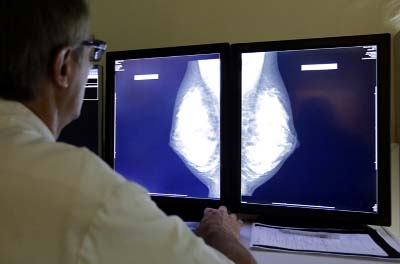
BBC, Washington :
Two-thirds of cancer cases are not influenced by heredity or risky habits, but lack of biological luck, say scientists.
Most types of cancer cannot be blamed on heredity or risky habits like smoking, says a US medical study, suggesting that two-third of the disease cases are caused by the “bad luck” of random DNA mutations.
“This study shows that you can add to your risk of getting cancers by smoking or other poor lifestyle factors,” said study author Bert Vogelstein, a professor of oncology at the Johns Hopkins University School of Medicine.
“However, many forms of cancer are due largely to the bad luck of acquiring a mutation in a cancer driver gene regardless of lifestyle and heredity factors.”
He added that people who live a long time without getting cancer, despite being long-time smokers or being exposed heavily to the Sun, do not have “good genes”.
“The truth is that most of them simply had good luck.”
The study in the January 2 edition of the journal Science was led by researchers at Johns Hopkins University and based on a statistical model that includes many types of cancer in a range of human tissues.
The team sought to look at cancer by searching the scientific literature for information on how many times stem cells divided over the course of an average person’s lifespan.
Breast and prostate cancers were not included in the study because the literature did not show reliable stem cell division rates in those areas of the body, the authors said.
About 22 cancer types arising in 31 tissues studied could be traced back to random mutations, the study found.
The other nine “had incidences higher than predicted by ‘bad luck’ and were presumably due to a combination of bad luck plus environmental or inherited factors,” the university said.
These nine types included lung cancer and skin cancer – which are influenced by exposure to smoke and sunshine – as well as some cancers known to be hereditary.
The findings suggest that an even greater emphasis should be placed on early detection of cancer and research that could detect these harmful random acts before they lead to widespread cancer.
Two-thirds of cancer cases are not influenced by heredity or risky habits, but lack of biological luck, say scientists.
Most types of cancer cannot be blamed on heredity or risky habits like smoking, says a US medical study, suggesting that two-third of the disease cases are caused by the “bad luck” of random DNA mutations.
“This study shows that you can add to your risk of getting cancers by smoking or other poor lifestyle factors,” said study author Bert Vogelstein, a professor of oncology at the Johns Hopkins University School of Medicine.
“However, many forms of cancer are due largely to the bad luck of acquiring a mutation in a cancer driver gene regardless of lifestyle and heredity factors.”
He added that people who live a long time without getting cancer, despite being long-time smokers or being exposed heavily to the Sun, do not have “good genes”.
“The truth is that most of them simply had good luck.”
The study in the January 2 edition of the journal Science was led by researchers at Johns Hopkins University and based on a statistical model that includes many types of cancer in a range of human tissues.
The team sought to look at cancer by searching the scientific literature for information on how many times stem cells divided over the course of an average person’s lifespan.
Breast and prostate cancers were not included in the study because the literature did not show reliable stem cell division rates in those areas of the body, the authors said.
About 22 cancer types arising in 31 tissues studied could be traced back to random mutations, the study found.
The other nine “had incidences higher than predicted by ‘bad luck’ and were presumably due to a combination of bad luck plus environmental or inherited factors,” the university said.
These nine types included lung cancer and skin cancer – which are influenced by exposure to smoke and sunshine – as well as some cancers known to be hereditary.
The findings suggest that an even greater emphasis should be placed on early detection of cancer and research that could detect these harmful random acts before they lead to widespread cancer.

